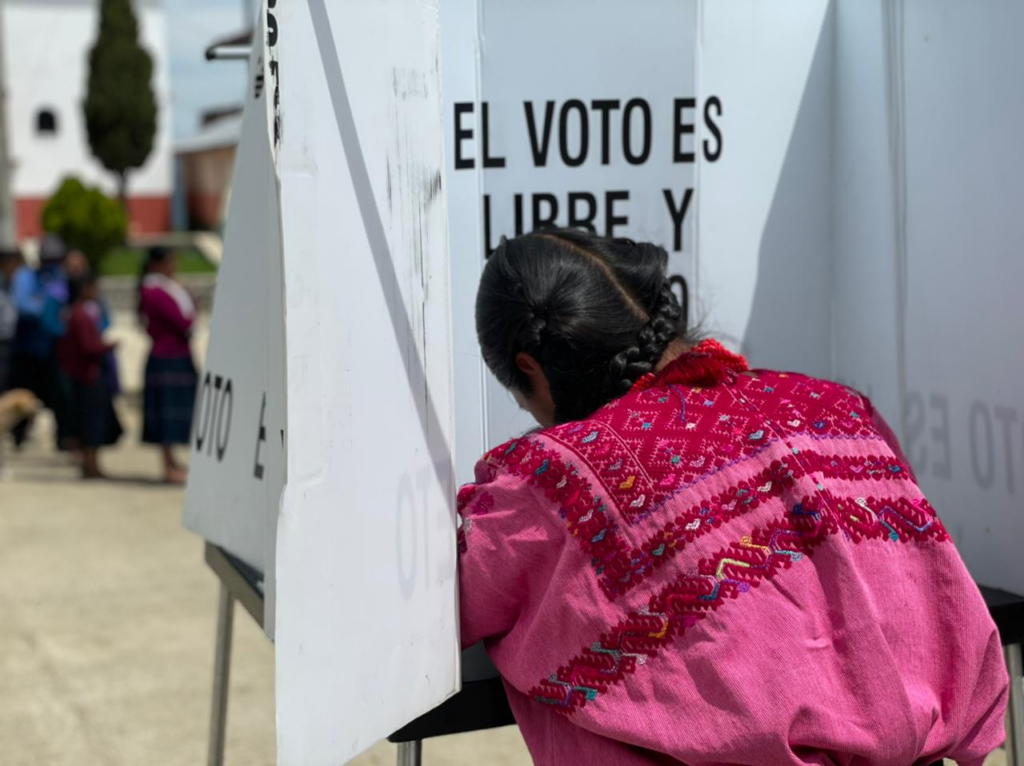
By Students of the Faculty of Law-UNACH
The presence of organized crime and the effective absence of the State represent a threat to democracy, with significant implications in the political, economic and social spheres.
The infiltration of organized crime into the life of communities in Chiapas has generated terror and distrust. The lack of state actions to combat it has allowed it to operate with impunity, controlling territories and populations.
The interest of these groups has also extended to candidates and political parties, who face direct threats against their integrity and that of their followers, limiting their ability to compete on equal terms and represent citizen interests. Likewise, the lack of information on electoral matters can affect participation and electoral procedures for making informed decisions.
The scarce employment opportunities also influence electoral preferences because the different political actors take advantage of this situation to obtain advantages through deceitful practices that use people’s needs.
On the other hand, the absence of transparency about the origin of resources for political campaigns can influence the democratic process, distorting the popular will and perpetuating the control of certain interest groups over political power. This is how the capture of the State by private interests, the existence of a network of cronyism and favoritism feed social inequality, undermine confidence in democratic institutions, erode the legitimacy of the government, political stability and the rule of law.
Faced with the loss of faith in the system, a hurt and tired population, full of uncertainty and fear; with a government that keeps us insecure and without full freedoms, the following questions arise: Why blame society for not wanting to participate in the elections? And why are those who can participate freely those who have the most, while the rest of us are spectators of what happens with our rights?
We will try to answer these questions as follows.
Impact on citizens
The lack of participation and fear of participating in electoral processes was triggered, in the last five years, by the greater tolerance that the State has given to criminal groups, and this has affected the lifestyle of all people in Chiapas, not only because they dispute control of the territory but also political and economic power and the population itself.
The violence has had serious repercussions, especially in 12 municipalities: La Trinitaria, Frontera Comalapa, Chicomuselo, Siltepec, Honduras de la Sierra, Motozintla, Mazapa de Madero, El Porvenir, La Grandeza, Bejucal de Ocampo, Amatenango de la Frontera and Bella Vista, where the installation of polling stations for the next elections will be quite a challenge.
Constitutionally, political participation is a right and an obligation for citizens, but when this right begins to be restricted due to insecurity, people are afraid to go out and participate, as happened on Friday, April 1st, 2022, when the Institute of Elections and Citizen Participation (IEPC) and the National Electoral Institute (INE) suspended elections in Frontera Comalapa and Honduras de la Sierra to preserve the integrity of citizens due to the violence that arose. The absence of security, expanded to several municipalities in the State, puts the next election day at risk.
Impact on the Economy
Francisco Rivas, director of the National Citizen Observatory, has pointed out that criminal groups also control the sale of various products, that is, they charge protection and fees to allow the distribution of merchandise, even farmers must pay if they want to plant a certain crop, while merchants are forced to only sell the merchandise of certain producers. This system of violence is naturalized because the victims have turned it into an everyday way of living. Meanwhile on the crime side, monopolies are created because by having control of the market they have the power to decide the prices of the products.
In Chiapas, the protection racket initially affected transporters and has spread to other sectors of the economy such as agriculture. In December 2023, local media reported that at least 30% of coffee producers in the Sierra had abandoned their crops as a result of protection prices, and the control of human trafficking routes and other illicit activities have generated the forced internal displacement of hundreds of families, especially in the border region, where there are also executions, disappearances, torture, threats and murder.
CONCLUSIONS
1. Chiapas is a disputed territory, which has unleashed panic, fear and insecurity.
2. Organized crime has taken over businesses, homes, families, places of coexistence, it has even cut off entire towns.
3. The naturalization of violence and dehumanization is the result of the indolence of the State. We have become a society where our daily bread is witnessing threats, intimidation, murder; and in the best of cases we remain as spectators, in the worst, victims or recruits.
4. The wave of violence, a slow economy, and misinformation will impact the next elections. There is even uncertainty as to whether it will be possible for polling stations to be installed in certain municipalities to vote.
5. We have had to grow up in a society where the headlines of the news have become “Drug trafficking is the fifth employer in Mexico.” A society that lives intimidated, with the feeling that our voice, rights and compassion have been taken away from us, leaving a blurry and uncertain future for the new generations, without opinion and without option.
Living in fear is living without freedom. The question we have to ask ourselves as citizens is: do I really want to continue in a society like this?
Prepared by students of the sixth semester, group B, of the Faculty of Law Campus III of the Autonomous University of Chiapas (UNACH):
Brian Ávila Borraz, Marión García Meléndez, Cassandra Cruz González, Mildred Ariadne Aguilar Pérez, Juliette Anthonielly Aguilar Pérez, Abisag Bibiana Álvarez González, Daniela Marroquín Escobar, Hannia Castillo González, Alisson Yire Castro Méndez, Allen Joseph López Parga, Jimena Isabel López Palacios, Elizabeth Bermúdez Guillén, Jesús Alexis Méndez López y Gabriela Navarrete Ramos.
Original article at Chiapas Paralelo on March 25th, 2024.
Translated by Schools for Chiapas.
